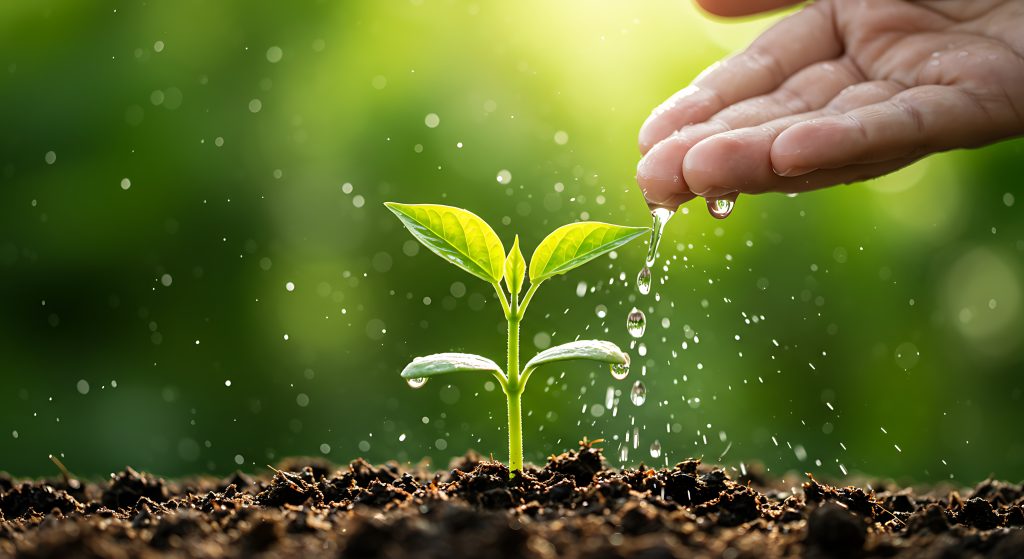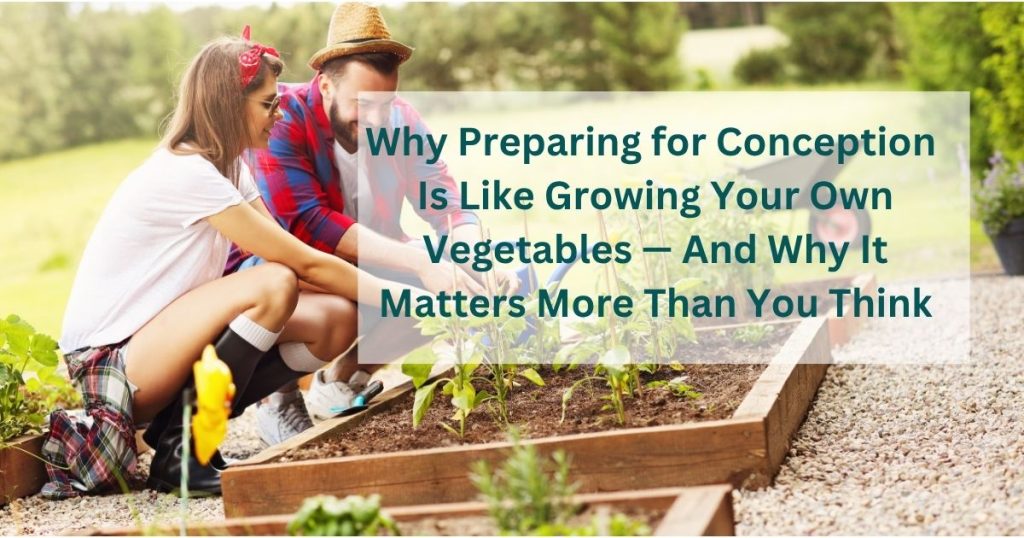One of the things my husband and I have done for many years now is grow our own vegetables. It’s something that brings us a lot of joy — especially when we start to see the results of our efforts: the first tomatoes ripening, the courgettes ready to pick, and the satisfaction of putting fresh, organic produce on our plates.
In truth, my husband tends to be the one in charge of the veggie patch, while I look after the flowers. But working together to care for our garden has taught me so much about patience, preparation, and the importance of nourishing the soil before expecting anything to grow.
And I often think trying to have a baby is no different.
You Don’t Just Throw Seeds on Untended Soil
Imagine you’ve decided to start growing your own vegetables. You’ve got the garden space or maybe an allotment — but the ground hasn’t been used for a while. It’s overgrown with weeds. The soil is dry, compacted, and full of stones.

Would you just throw some seeds in and hope for the best?
Of course not.
You’d start by clearing the weeds, turning over the soil, and removing anything that doesn’t belong. You’d dig in compost or organic matter to add nutrients, making sure the soil is rich and hydrated — the kind of environment where new life can thrive.
Then you’d plant your seeds. But even then, the work isn’t done. You’d keep tending them: watering, feeding, checking on their progress, and making adjustments to help them grow strong and healthy.
Trying to Conceive Needs the Same Thoughtful Preparation
Now, let’s bring that analogy back to fertility.
If you’ve made the decision to start trying for a baby, whether naturally or with the help of IVF, it can be tempting to jump straight into the process. But just like with gardening, the real magic happens when you take time to prepare the ground first.
That means preparing your body (and your partner’s) so that you’re both in the best possible health for conception to happen and for a healthy pregnancy to follow.
Because the truth is: your body needs to feel safe and nourished before it will prioritise reproduction.
Why Preparation Is So Important — Even If You Feel Healthy
Here’s something I see time and time again in my work with couples: many people think they’re in good health because they don’t have a specific diagnosis or major symptoms. But fertility is incredibly sensitive to small imbalances in the body — many of which go unnoticed or are brushed off as “normal.”
Take gut health, for example.
Many people experience digestive symptoms like bloating, gas, indigestion, or constipation. These are often dismissed as no big deal — but they can be early warning signs that your gut isn’t functioning optimally.
Why does that matter?
Because your gut plays a major role in regulating hormones (especially oestrogen), absorbing nutrients, supporting your immune system, and even balancing your mood. If your gut is out of balance, there’s a good chance your hormones are too — and that can make it harder to conceive.
And here’s the thing: physical symptoms of poor health can take years to show up clearly. Just because you feel okay on the surface doesn’t mean everything underneath is functioning as it should.
Building a Fertile Foundation – Together
Preparing for conception isn’t just about taking folic acid and crossing your fingers.
It’s about:
- Improving egg and sperm quality through nutrition, lifestyle, and stress reduction
- Balancing hormones by addressing gut health, sleep, and toxin exposure
- Supporting mental and emotional wellbeing so that your nervous system feels safe
- Making intentional changes that create a nourishing environment for new life
And this applies to both partners. Male fertility accounts for around 50% of fertility challenges, yet it’s often overlooked. The health of the sperm is just as important as the health of the egg when it comes to conceiving and having a healthy baby.
Overwhelmed? You Don’t Have to Do This Alone
I know it can feel overwhelming. Maybe you’re unsure where to start. Maybe you’ve already tried a few things but nothing seems to be working. Or maybe IVF feels like your only option — and you’re wondering if there’s anything you can do to boost your chances.
IVF can be a physical and an emotionally stressful process. It can also create stress around finances too. Taking the time to prepare could reduce the likelihood of having several rounds of treatment and you never know, you may even find yourself conceiving naturally.
If that’s you, know this:
You’re not alone. And there are things you can do that can make a real difference.
The key is finding the right changes — the ones that address what’s really going on in your body, and in your life.
Ready to Prepare the Soil for New Life?
If you’re ready to take a more holistic approach — one that supports your whole health and addresses the root causes of what might be getting in the way — I’d love to support you.
Let’s have a confidential, no-pressure chat and explore what’s possible for you and your partner.
🌱 Book your free Fertility Focus Call today and take the first step towards growing your family, naturally and with confidence.



